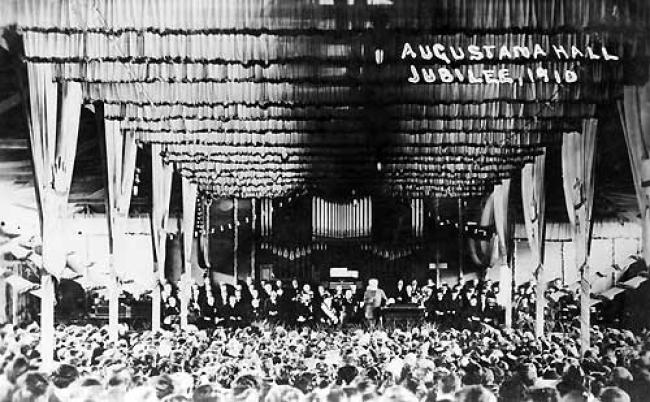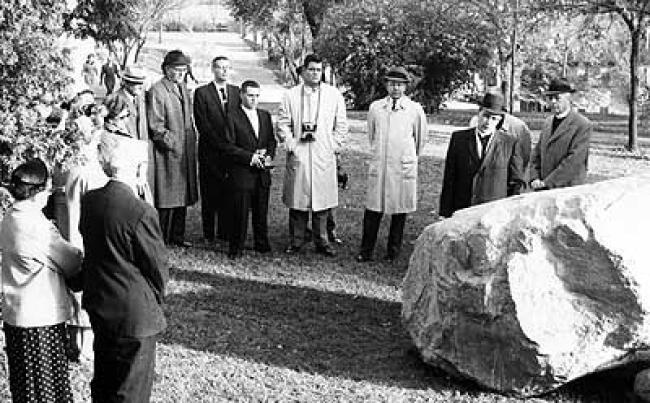Anniversary tales: from jubilee halls to Facebook
(This story was written in celebration of Augustana's sesquicentennial in 2010.)
"All of us human beings are prone to lapse now and then into emotional musings on the past, while, as a rule, we likewise are very much inclined to the celebration of anniversaries, reminding us of the things and people of the past, whom we like to remember"
— C.O. Granere, on Augustana's 50th anniversary
Anniversaries are a good time for looking backwards, and the sesquicentennial is not the first time Augustana has celebrated its history. Dour portraits aside, the early Augustana faculty liked to party, though they would define those early celebrations in a much different way than we do today.
In the early years of the college, celebrations, then usually known as jubilees, were almost a frequent occurrence. A jubilee in November 1893 celebrating the 400th birthday of Martin Luther included speeches by Augustana Synod leaders and music such as Handel's Messiah, Haydn's Creation, and Wennerberg's Psalms. Only one afternoon session of the celebration was in English; all the others were held in Swedish. In June of 1893 a jubilee was again held, this time celebrating the 300th anniversary of Sweden's establishment as a Lutheran nation. Bishop K.G. von Scheele of Sweden was the guest of honor, and musical performances once again contributed to the event's success.

The 50th
But it is the celebration of Augustana's own history that led to the greatest festivities. The 1910 Jubilee, held in honor of the college's 50th anniversary, was a marathon lasting from June 5 through the 15. The first part of the session (June 5-9) was devoted to the commencement of Augustana College and Theological Seminary, while June 9-15 was devoted to the Augustana Synod and included their regular meetings and reports as well as historical sessions.
The Jubilee was honored with greetings from President Taft and the King of Sweden, which were read aloud to attendees. All activities took place in Jubilee Hall, a temporary building constructed for the event; the building could hold 4,000 people and was filled to capacity several times during the jubilee. Commencement activities included eight five-minute speeches on "The Pioneers of Augustana," as well as speeches by Gov. Eberhart of Minnesota, Bishop K.G. von Scheele of Sweden, and the speech by C.O. Granere quoted at the beginning of this story. Granere was the only living representative of those who had taught at Augustana in 1875 when its doors first opened in Rock Island.
The 100th
One of the main features of Augustana's centennial celebrations in 1960 is still visible on campus today: Centennial Hall. Both Centennial Hall and the College Union (Biology Building) were dedicated in 1960. Major events for the centennial included speeches by Nobel Laureate Glenn T. Seaborg and poet Mark Van Doren and a performance in the new Centennial Hall by the Chicago Symphony Orchestra. Centennial Hall also was the site of all performances for the Tri-Cities Symphony and the Handel Oratorio Society during the centennial year. In another musical event, the Augustana Choir appeared with the NBC orchestra on Easter morning.
It was not only Augustana which celebrated this momentous occasion, however. On June 6, two whole sections (12 and 10 pages respectively) of the Rock Island Argus were devoted to Augustana College, under the overall headline "Swedish Immigrant Dream Realized; Hail Centennial!" These sections included numerous stories about both the college and the synod, including historical stories, as well as ads from local businesses congratulating Augustana. WHBF-TV broadcast interviews with senior professors on their philosophies of life and teaching. One other marker of the centennial still stands on campus: the centennial boulder on Zion Hill, erected to honor the "memory and ideals" of Augustana's founders.

The 125th
Augustana once again celebrated a milestone in 1985, when it turned 125 years old. In honor of this achievement, on Jan. 25, 1985, students sponsored a birthday party in the College Center with cake, punch, and balloons — a more informal celebration than in earlier years. Once again the arts proved an important part of the college's celebrations, as special events included performances by the choir and band and a theatrical performance of Ibsen's The Wild Duck. Swedish Archbishop Bertil Werkstrom brought greetings from Sweden during his visit, and Augustana was recognized by Congress. Founders Day, April 27th, was celebrated with a campus open house and special displays and demonstrations by many departments.
No "Jubilee Halls" have been built for our sesquicentennial, but the 150th website has been designed to bring us all together under one roof. In the new world of social media, we gather at online guestbooks and view digital photos of Augustana's past; our methods of celebration may be changing, but the opportunity to reflect on Augustana's history remains unchanged.
— Sarah Horowitz
Special Collections Librarian
